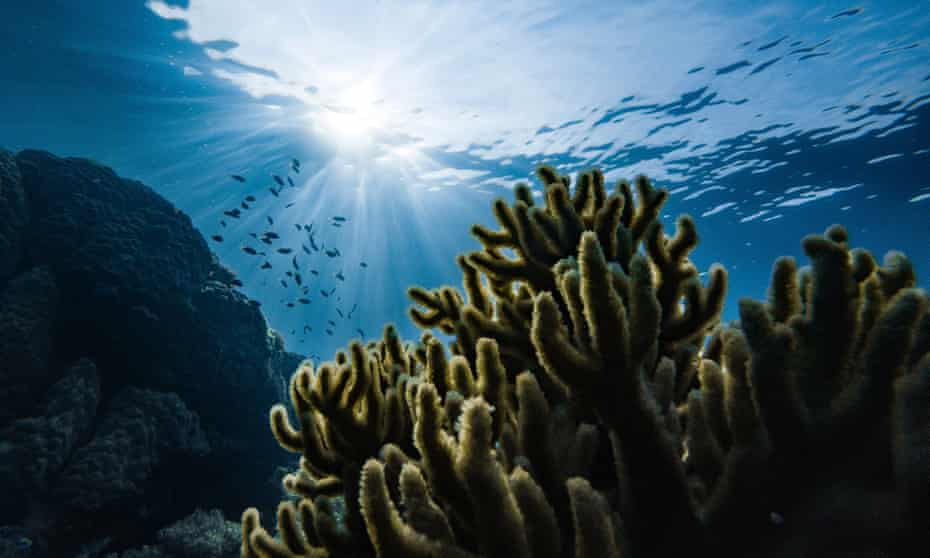11 Dec 2024

Tired Earth
By The Editorial Board

Unesco recommended earlier this year that Australia’s Great Barrier Reef be placed on its ‘in danger’ list, but Australia is calling for a ‘more consistent approach’ to sites affected by climate change. Photograph: Marek Okon/Unsplash
A dozen countries have accused the Australian government of trying to hit pause on a process that could still lead to the Great Barrier Reef being placed on a list of world heritage sites “in danger”.
But a global climate change policy to guide how more than 190 countries deal with the crisis affecting some of the world’s most special places, couldn’t be agreed on at a major international meeting in Paris.
At the general assembly meeting for the UN’s world heritage convention – a treaty signed by more than 190 countries to protect the most special places on Earth – Australia raised fears if sites were placed on the “in danger” list, they could stay there forever.
Earlier this month the Guardian revealed Australia was lobbying against a section of the new climate policy that asked countries to adopt domestic measures that explicitly kept global heating to 1.5C. Australia preferred more generic language.
Unesco recommended earlier this year the reef be placed on a list of world heritage sites “in danger” – the first time a site would have made the list chiefly because of impacts from climate change.
Corals bleached en masse across the world’s biggest reef system in 2016, 2017 and 2020 in events caused by rising ocean temperatures driven by global heating.
Intensive lobbying from Australia delayed the “in danger” listing, with a decision due to be considered again at a meeting in Russia in June next year.
On Saturday, Australian government representative James Larsen told the general assembly climate change needed to be addressed and a new policy was “long overdue”.
But he said: “What in particular is the route off the ‘in danger’ list for a single property if the dangers concerned are global developments that require global solutions?
“Are we to accept a future where a large proportion of properties are to languish permanently on the ‘in danger list’ with no resolution deliverable by the state party concerned?,” Larsen, who is deputy secretary of the environment department, said.
More than 190 countries have signed the world heritage convention, but its climate change policy has not been updated since it was adopted in 2007.
Because of the large number of changes proposed by Australia and others, countries couldn’t agree on the new policy and agreed instead to develop a working group.
At this point, Australia – backed by Japan and Poland – asked the assembly to agree to officially note the “desirability of avoiding decisions which would otherwise pre-empt the outcomes” of those deliberations.
Norway’s representative Eva Hauge Fontaine said Australia’s request was “highly inappropriate”, saying the language being proposed would have suspended the process for putting sites on the world heritage “in danger” list.
But Larsen told the meeting that was not Australia’s intention and the language would not have stopped sites being placed on the in danger list.
The appeal did not convince a dozen countries who successfully pushed for Australia’s paragraph to be deleted.
Led by Palestine and Norway, the other countries opposing Australia were Iran, China, France, Russia, Sweden, Germany, the Czech Republic, Finland, Thailand and Belgium.
Imogen Zethoven, an adviser on world heritage issues to the Australian Marine Conservation Society, said: “The Morrison government tried to water down Unesco’s climate change policy to ensure it wasn’t required to take action on climate change to protect the Great Barrier Reef. It failed.
“The failure of the Morrison government’s amendments at the general assembly means the World Heritage Committee can request ambitious climate action by Australia in line with 1.5C degrees to help protect the future of the reef. The government was trying to ensure this could not happen.”
Since then, Unesco has found about one third of all the sites listed for their natural significance are under threat from the impacts of climate heating, such as rising temperatures, sea levels and extreme weather events.
The Australian government has said the world heritage convention should not be used as a mechanism to encourage countries to take action on climate change, and that this should be left to the UN’s climate treaty.
The UN’s science advisers are due to visit the Great Barrier Reef on a monitoring mission, and then produce a report to be considered at the Russia meeting next year.
A spokesperson for environment minister Sussan Ley said Australia wanted a consistent approach for sites being affected by climate change “that does not see one site singled out when others are equally affected”.
He said Australia had successfully proposed a working group with an expert panel to look at the climate policy in time for the next general assembly in 2023.
Source : theguardian.com
Comment